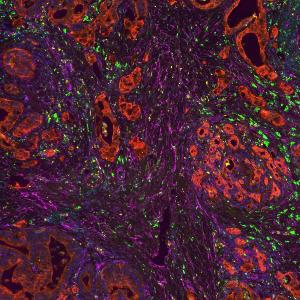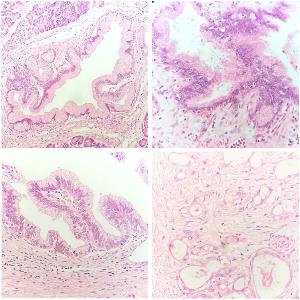Ormanns Lab
Pancreaticobiliary translational research group
Pancreaticobiliary translational research group

Multiplex immunofluorescence of pancreatic cancer tissue
Our research projects focus mainly on solid malignancies such as pancreatic cancer, colorectal cancer, bladder cancer and cholangiocellular carcinoma.
Pancreatic ductal adenocarcinoma is a devastating disease with mortality rates close to incidence rates. The majority of pancreatic cancer is diagnosed at an advanced stage, when metastasis occurred. In a minority of the cases, curative intent surgical resection is an option or resectability can be achieved by neoadjuvant chemotherapy.
As a research group coming from pathology, our focus is to study the biological traits of diseases by in situ analyses, using the tissue samples we examine for diagnostic purposes on a daily basis. We then translate these insights into functional assays to deepen our understanding. Our ultimate goal is to improve the diagnosis, prognostication and therapy of cancer patients.

Histological growth patterns
To this aim, we examine mutational signatures, methylation and gene expression patterns, as well as the composition of the tumor microenvironment including the tumor microbiome and correlate these characteristics with the patients´ outcome and response to therapy. Often, we rely on patient material and corresponding data from randomized clinical trials led by our clinical collaborators.
We are a translational research group working as a link between clinical and basic research, embedded in multidisciplinary collaborative networks at Ludwig-Maximilians-University, top ranking on national and European level (see http://www.expertscape.com/ex/pancreatic+cancer/c/de).
Doctoral student
TPX2 expression as a negative predictor of gemcitabine efficacy in pancreatic cancer
Guenther M, Surendran SA, Haas M, Heinemann V, von Bergwelt-Baildon M, Engel J, Werner J, Boeck S, Ormanns S.
Br J Cancer 2023 - doi: 10.1038/s41416-023-02295-x
In this study we explore the meaning of TPX2 expression for the response to gemcitabine-based palliative and adjuvant chemotherapy in pancreatic cancer. We show that high TPX2 levels lead to chemotherapy resistance as it is associated with the expression of chemotherapy-resistance promoting genes. We propose TPX2 as a potential biomarker to inform therapy decisions.
Bacterial Lipopolysaccharide as a Negative Predictor of Adjuvant Gemcitabine Efficacy in Pancreatic Cancer.
Guenther M, Gil L, Surendran SA, Palm MA, Heinemann V, von Bergwelt-Baildon M, Mayerle J, Engel J, Werner J, Boeck S, Ormanns S.
JNCI Cancer Spectrum 2022 - https://academic.oup.com/jncics/article/6/3/pkac039/6588686
In this paper, we show that the detection of bacterial lipopolysaccharide (LPS), in the tumor tissue of resected pancreatic cancer patients is associated with poor response to adjuvant gemcitabine based chemotherapy after resection and defines a specific tumor microenvironment. As a cell wall component of gram-negative bacteria, LPS detection serves as a surrogate for the colonization of the tumor by mainly gram-negative microbes, which has been associated with gemcitabine resistance in pe-clinical models. Our findings implicate a role of the tumor microbiome as a therapy target in pancreatic cancer.
The impact of adjuvant therapy on outcome in UICC stage I pancreatic cancer.
Guenther M, Boeck S, Heinemann V, Werner J, Engel J, Ormanns S.
International Journal of Cancer 2022 - https://onlinelibrary.wiley.com/doi/10.1002/ijc.34044
Whether adjuvant therapy is beneficial in early stage pancreatic cancer remains a matter of debate, as these patients were underrepresented in the large randomized control trials on adjuvant treatments or their data cannot be readily extracted. In this study we examine how the administration of adjuvant therapy affects the outcome of early stage pancreatic cancer patients, i.e. patients with small tumors without lymph node metastasis. We could show that adjuvant therapy has a major positive impact on their outcome as it prolongs disease free survival and overall survival times resulting in more than doubled five-year survival rates. We conclude that every pancreatic cancer patient should be offered some kind of adjuvant therapy no matter how small the primary tumor was on resection.
All publications